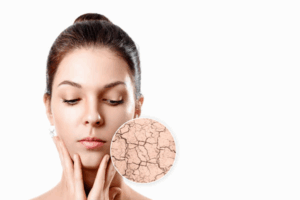Ah, the winter season is just around the corner. A season of cold air, warm blankets, and skin issues? Unfortunately, the drop in temperature can also bring a rise in different winter skin issues in dry, flaky, and irritated skin.
But don’t worry – understanding the different types of winter skin woes can help you combat them before they even start. From eczema flare-ups to chapped lips, knowing what’s causing your skin issues is the first step to finding a solution.
So grab a cup of hot cocoa and prepare to take a deeper look into winter skin issues and how you can overcome them.
Protect Your Skin From The Cold – Tips For Keeping Your Skin Hydrated And Healthy During The Winter
With winter approaching, it’s important to remember to take care of your skin. The colder weather can cause our skin to become dry, flaky, and dehydrated, leading to irritation and even cracking.

Incorporating a winter skincare routine into your daily habits can help prevent these issues and keep your skin healthy and hydrated all season. Remember, investing time into caring for your skin now can lead to long-term benefits.
“Beautiful Skin Requires Commitment, Not a Miracle.”
(Erno Laszlo)
Combat Dehydration – Skincare Ingredients That Can Help Replenish Your Moisture Levels
The dry, harsh winter weather strips our skin of precious moisture, leaving it tight, flaky and uncomfortable.
But fear not, as there are a ton of winter-hydrating skincare ingredients that can help replenish your moisture levels. Look for products that contain hydrating ingredients such as hyaluronic acid, glycerin and aloe vera. These miracle workers will help your skin retain moisture and give you a glowing complexion.

Exfoliate With Care – Benefits of Regular Exfoliation For Healthy Winter Skin
Look for gentle and non-abrasive exfoliants, like those made with natural ingredients such as oatmeal or sugar. Also, moisturize afterwards with a hydrating ingredient for winter skin, such as hyaluronic acid or glycerin.
These simple steps allow you to enjoy the benefits of regular exfoliation without harming your delicate skin.
To Know More About Winter Skin Care Routine, Check Out: Winter Skincare Tips From Dermatologists
Choose Natural Ingredients – A Look at How Natural Oils And Kinds of Butter Can Help With Dryness And Irritation.
Ingredients like shea butter, coconut, and jojoba oil are known for their nourishing skincare properties and ability to moisturize the skin deeply. Choosing natural ingredients benefits our skin and helps support sustainable and eco-friendly practices.
So why not use natural oils and butter for your next skincare purchase? Take care of your skin while also taking care of the environment.
Changes In The Layers Of Skin In Winter
As the winter season sets in, taking care of your skin is essential to avoid the dreaded dry, flaky skin that often accompanies the colder months. All three layers of our skin can be affected during this season.
Outer Layer
- The outer layer, the epidermis, is the first defense against the elements. It can become dehydrated and cracked, leading to irritation and redness.
Middle Layer
- The middle layer, the dermis, contains blood vessels that regulate our body temperature. In winter, the cold causes these vessels to constrict, reducing blood flow and oxygen to the skin. That can cause a dull, tired complexion and even exacerbate conditions like eczema.
Hypodermis
- Finally, the deepest layer, the hypodermis, contains fat cells that provide insulation and protection. However, in winter, the cold can cause these cells to shrink, leaving the skin feeling thin and fragile.
By taking care of all layers of our skin, we can keep it healthy and glowing all season long. By using nourishing skincare products, you can help replenish your skin’s natural oils and keep it healthy and radiant throughout the winter season.
We hope this guide has helped you understand the unique needs of winter skin. To end, remember that everyone’s skin is fantastic, and what works well for someone else may not fit you.
Consider both your lifestyle and which ingredients are suitable or beneficial for your specific complexion, and experiment until you find a combination that resonates with you.


